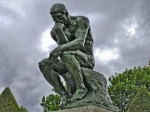
Cars are designed by designers, engineers, scientists, and not by accident during assembly. Photo by Andrey Vaganov
Is chance and only he the inventor of the new in the world of the living? This question, from the point of view of Darwin's evolutionary theory and all its improvements up to the very latest, seems absolutely absurd. Well, of course, new species, genera, families and classes of living beings arise only as a result of a) mutations and b) artificial selection. The new is the result of a) chance and b) the struggle for existence. And nothing more. According to the theory of evolution.
The point of view of religious consciousness is absolutely different. New species arise as an act of creation of a higher mind - God translated from philosophical into human languages.
Is it possible to combine the first with the second? Of course. The intervention of the mind at important stages - such as the emergence of a new species of living beings that does not interbreed with those from which they originated - does not exclude intraspecific evolution. And natural selection.
Let us pay attention, however, to the fact that in human civilization new technologies are never created as a result of chance. Not like a new generation of computers or cars, but even a chisel, a spoon or a hammer were not randomly created. To create them, engineering thought was needed, which absolutely does not exclude the presence of evolution. Whether it's computers, televisions or cars, the evolution of all technological products from phones to refrigerators is evident. That's just the reason for it is not an accident and not a struggle for existence, but a plan.
Imagine a street - the Champs-Elysées in Paris or Broadway in New York - where a movie camera shoots the roadway once a day from the beginning of the 20th century to the present day, and then reproduces the resulting images at the usual speed for cinema - 24 frames per second. It is easy to calculate that from 118 years of filming, you will get a half-hour film, when viewing which the evolution of cars, similar to the evolution in the living world, is obvious.
However, if someone concludes from the existence of the evolution of cars that mutations and selection are the reason for the improvement of cars from the Ford of 1908 to the Mustangs and Mercedes of 2018 - absolutely natural and inevitable from the point of view of Darwinism - then he will be mistaken. Cars are designed by designers, engineers, scientists, and not by accident during assembly. Mutations and natural selection do not play a role in the evolution of cars. In human society, they are created by reason (engineering thought). And only then the project is embodied in the product. Thus, the creation of new types of products in human society, which is part of the biocenosis, differs dramatically from the appearance of new types in wildlife.
Between creations in vivo (according to the evolutionary theory of life) and in civo (in civilization), if evolution in the living world is considered in a purely materialistic framework, the difference is fundamental and colossal. No technology is created by man as a result of chance. All technologies appear as a result of intelligent design, as opposed to evolutionary theory, according to which new species arise only as a result of accidents (mutations) and the struggle for the existence of species. And nothing else!
Albert Einstein's famous phrase, said during a dispute with Niels Bohr about quantum mechanics, was criticized by the creator of the theory of relativity: "God does not play dice" (in the German original - Der Herrgott wurfelt nicht). This statement, similar to a question, fully applies to the theory of evolution. Does God play with probabilities by tossing a coin, or does he allow nature to evolve by creating a variety of mutations, but they do not play a role in the decisive moments of the emergence of new species?
No less interesting in connection with what has been said is Pushkin's attitude to the problem of chance as opposed to creation by the mind. Let us turn to the lines found in the first volume of the 10-volume collected works of Alexander Sergeyevich: “Oh, how many wonderful discoveries we have / The spirit of enlightenment is preparing / And experience, the son of difficult mistakes, / And genius, friend of paradoxes, / And chance, God is an inventor ... »
Those who are over fifty, sixty, seventy, and even just over forty, remember that in the television program "Obvious - Incredible" by Sergei Petrovich Kapitsa, the first four of these five lines were taken as an epigraph. It was with them that each of the programs began. Why didn't Kapitsa include the fifth line in the intro? Undoubtedly, because of the mention of God, in Soviet times on television, it was possible only in an atheistic context. However, let's take a look at these lines. And especially intently in the last: "And the case, God is the inventor ..."
What does a comma mean? That god the inventor is a case? Or the words about the god inventor are part of the enumeration: “Oh, how many wonderful discoveries are being prepared for us”:
1) "enlightenment spirit"; 2) "experience, the son of difficult mistakes"; 3) "genius, friend of paradoxes"; 4) "case"; 5) "God is the inventor." Items 4 and 5 in this list of "wonderful discoveries" are independent from each other or are they combined into one? Does Pushkin regard chance as God the inventor, or does chance stand alone and God the inventor separately?
It is impossible to answer this question unambiguously. Pushkin, using the subtleties of Russian grammar, makes it possible to interpret the case either as a god-creator, or the case - in itself, and the god-creator and inventor - in itself. Either both together, or chance and God - separately, and if together, then in some imperceptibly finest poetic (and also religious) proportion.
But this is the key problem in the theory of the origin of life and man! Is mutation (chance) the inventor god, and there is nothing else besides it, or does the inventor god complete the list, standing above him!
And this was written before Darwin, before quantum mechanics, before the theory of evolution, before the discovery of mutations in genes. And there was not the slightest idea about genes in Pushkin's time!
Let's not fall into madness, attributing to Pushkin the creation of the theory of evolution. And even "only" to consider the great poet its forerunner. But there is no doubt that Pushkin's brilliant mind sensed the enormous problem that arises between divinity and chance, creation and evolution.
Has the problem of who (or what) is the creator of the new in the world of the living been resolved since the moment Pushkin wrote the quoted lines: chance or the god of invention and creation? It seems that it has remained just as unrequited and important as it was in Pushkin's time.
NY
 Considerations and thoughts*
Considerations and thoughts*